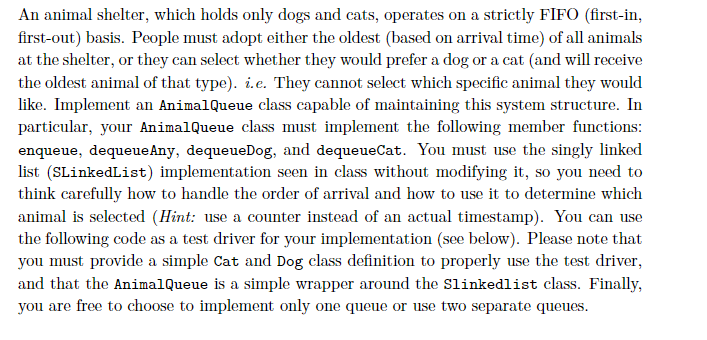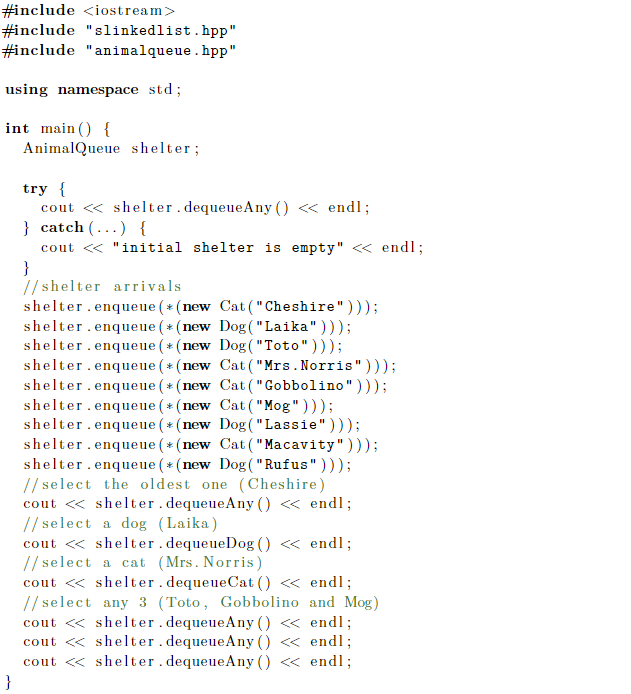(Solved): ^^The test driver This was the slinkedlist.hpp #ifndef SLINKEDLIST_HPP #define SLINKEDLI ...

^^The test driver
This was the slinkedlist.hpp
#ifndef SLINKEDLIST_HPP
#define SLINKEDLIST_HPP
#include <iostream>
template<typename T> class SLinkedList;
template<typename T> std::ostream& operator<<(std::ostream&, const
SLinkedList<T>&);
template<typename T>
class SLinkedList {
private:
class SNode {
public:
T elem;
SNode* next;
};
private:
SNode* head;
public:
SLinkedList();
~SLinkedList();
bool empty() const;
int len() const;
const T& front() const;
T greatestValue() const;
void addFront(const T& e);
void addBack(const T& e);
void addSorted(const T& e);
T removeFront();
bool remove(T v);
void reverse();
void clear();
friend std::ostream& operator<< <T>(std::ostream& out, const SLinkedList<T>& sl);
};
template<typename T>
SLinkedList<T>::SLinkedList() : head(NULL) {}
template<typename T>
SLinkedList<T>::~SLinkedList() {
clear();
}
template<typename T>
bool SLinkedList<T>::empty() const {
return head == NULL;
}
template<typename T>
int SLinkedList<T>::len() const {
SLinkedList<T>::SNode* p = head;
int i = 0;
while(p != NULL) {
i++;
p = p->next;
}
return i;
}
template<typename T>
const T& SLinkedList<T>::front() const {
return head->elem;
}
template<typename T>
T SLinkedList<T>::greatestValue() const {
SLinkedList<T>::SNode* p = head;
T v = head->elem;
while(p != NULL) {
if(p->elem > v)
v = p->elem;
p = p->next;
}
return v;
}
template<typename T>
void SLinkedList<T>::addFront(const T& e) {
SLinkedList<T>::SNode* v = new SNode;
v->elem = e;
v->next = head;
head = v;
}
template<typename T>
void SLinkedList<T>::addBack(const T& e) {
SLinkedList<T>::SNode* v = new SNode;
v->elem = e;
v->next = NULL;
if(empty())
head = v;
else {
SNode* p = head;
while(p->next != NULL)
p = p->next;
p->next = v;
}
}
//insertion sort
template<typename T>
void SLinkedList<T>::addSorted(const T& e) {
SLinkedList<T>::SNode* v = new SNode;
v->elem = e;
v->next = NULL;
if(empty())
head = v;
else if(v->elem <= head->elem) {
v->next = head;
head = v;
}
else {
SLinkedList<T>::SNode* p1 = head;
SLinkedList<T>::SNode* p2 = p1;
while(p1 != NULL && v->elem > p1->elem) {
p2 = p1;
p1 = p1->next;
}
p2->next = v;
v->next = p1;
}
}
template<typename T>
T SLinkedList<T>::removeFront() {
SNode* p = head;
T v = head->elem;
head = p->next;
delete p;
return v;
}
template<typename T>
bool SLinkedList<T>::remove(T v) {
SLinkedList<T>::SNode* p1 = head;
SLinkedList<T>::SNode* p2 = p1;
if(head->elem == v)
return removeFront();
while(p1 != NULL) {
if(p1->elem == v) {
p2->next = p1->next;
delete p1;
return true;
}
p2 = p1;
p1 = p1->next;
}
return false;
}
template<typename T>
void SLinkedList<T>::reverse() {
SLinkedList<T>::SNode* p1 = head;
SLinkedList<T>::SNode* p2 = NULL;
while(head != NULL) {
head = p1->next;
p1->next = p2;
p2 = p1;
p1 = head;
}
head = p2;
}
template<typename T>
void SLinkedList<T>::clear() {
while(!empty())
removeFront();
}
//global
template<typename T>
std::ostream& operator<<(std::ostream& out, const SLinkedList<T>& sl) {
typename SLinkedList<T>::SNode* p = sl.head;
out << "HEAD" << "->";
while(p != NULL) {
out << p->elem << "->";
p = p->next;
}
out << "NULL";
return out;
}
#endif
Expert Answer
To implement an AnimalQueue class that maintains the system structure described, you can create a class that wraps around the provided SLinkedList cla
